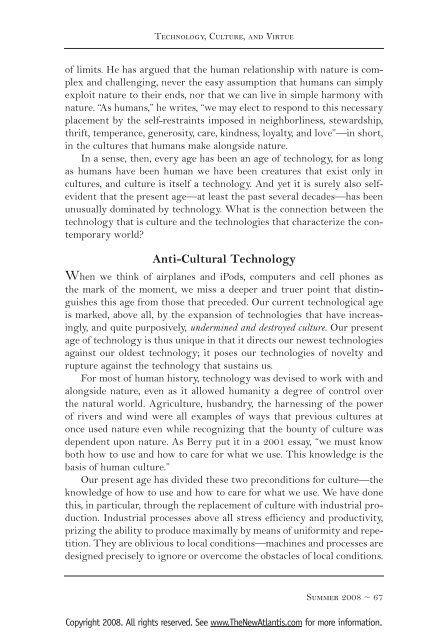<strong>Patrick</strong> J. <strong>Deneen</strong><strong>The</strong> necessity of culture for human survival <strong>and</strong> flourishing alsodem<strong>and</strong>ed a human vessel in which such memory could be transmitted—namely the city, itself a masterpiece of technology. Indeed, for this reasonAristotle writes that “man is by nature the political animal,” underst<strong>and</strong>ingthat we would not be human but for our capacity to govern ourselvesin concert with one another, to create stable <strong>and</strong> longst<strong>and</strong>ing humancommunities. <strong>Culture</strong> couldn’t perpetuate itself in the absence of politics,<strong>and</strong> thus politics <strong>and</strong> culture are mutually reinforcing; politics <strong>and</strong> polisare shaped by culture even as they shape the culture.While Pico undoubtedly understood rightly that humanity thus in asense “makes itself,” we should be cautious about the more Prometheaninclinations of his assertion about the primacy of human choice <strong>and</strong>freedom. <strong>Culture</strong> is not an amorphous or infinitely flexible creation ofhumanity. <strong>Culture</strong>—as the word, so closely related to cultivation <strong>and</strong> agriculture,suggests—is deeply related to, <strong>and</strong> dependent upon, the facts ofthe natural world, including human nature. This st<strong>and</strong>s to reason, sinceculture arose as a way for us to preserve <strong>and</strong> transmit our inheritance ofhow to survive <strong>and</strong> even thrive in a world at once replete with gifts <strong>and</strong>dangers. <strong>Culture</strong> has always centered on the most elemental: our relationshipto the earth <strong>and</strong> the plants that spring from it; our relationship tothe beasts, both their bounty <strong>and</strong> the threats they pose; our relationship toone another—through marriage, in raising children <strong>and</strong> making families,<strong>and</strong> in forging lasting communities that remember the past <strong>and</strong> are mindfulof the future; <strong>and</strong> our relationship to the divine, the mysterious powersthat order <strong>and</strong> govern a universe that we did not create <strong>and</strong> that we donot own. Human culture is itself a technology, <strong>and</strong> the technologies thathave been preserved in human cultures have worked alongside nature.To use the language of Wendell Berry, culture “proposes an atonementbetween ourselves <strong>and</strong> our world, between economy <strong>and</strong> ecology, betweenthe domestic <strong>and</strong> the wild.” <strong>Culture</strong>, in a sense, is the intermediate realmbetween nature <strong>and</strong> the human, keeping us tethered to the natural worldeven as it enables us to st<strong>and</strong> apart from it, <strong>and</strong> to use <strong>and</strong> alter it.Berry—a poet, novelist, essayist, <strong>and</strong> farmer—is an especially ableguide in this terrain. His work has drawn deeply from his experience <strong>and</strong>defense of traditional farming. Eschewing most modern advances thathave ushered in an age of industrial farming with their emphasis uponeconomies of scale <strong>and</strong> efficiency, Berry has insisted that small-scale <strong>and</strong>family-based farming is a form of culture that pervades not just the productionof food, but a way of life that emphasizes localism, community, amoral economy <strong>and</strong> culture, <strong>and</strong> a necessary <strong>and</strong> inescapable recognition66 ~ <strong>The</strong> <strong>New</strong> <strong>Atlantis</strong>Copyright 2008. All rights reserved. See www.<strong>The</strong><strong>New</strong><strong>Atlantis</strong>.com for more information.
<strong>Technology</strong>, <strong>Culture</strong>, <strong>and</strong> <strong>Virtue</strong>of limits. He has argued that the human relationship with nature is complex<strong>and</strong> challenging, never the easy assumption that humans can simplyexploit nature to their ends, nor that we can live in simple harmony withnature. “As humans,” he writes, “we may elect to respond to this necessaryplacement by the self-restraints imposed in neighborliness, stewardship,thrift, temperance, generosity, care, kindness, loyalty, <strong>and</strong> love”—in short,in the cultures that humans make alongside nature.In a sense, then, every age has been an age of technology, for as longas humans have been human we have been creatures that exist only incultures, <strong>and</strong> culture is itself a technology. And yet it is surely also selfevidentthat the present age—at least the past several decades—has beenunusually dominated by technology. What is the connection between thetechnology that is culture <strong>and</strong> the technologies that characterize the contemporaryworld?Anti-Cultural <strong>Technology</strong>When we think of airplanes <strong>and</strong> iPods, computers <strong>and</strong> cell phones asthe mark of the moment, we miss a deeper <strong>and</strong> truer point that distinguishesthis age from those that preceded. Our current technological ageis marked, above all, by the expansion of technologies that have increasingly,<strong>and</strong> quite purposively, undermined <strong>and</strong> destroyed culture. Our presentage of technology is thus unique in that it directs our newest technologiesagainst our oldest technology; it poses our technologies of novelty <strong>and</strong>rupture against the technology that sustains us.For most of human history, technology was devised to work with <strong>and</strong>alongside nature, even as it allowed humanity a degree of control overthe natural world. Agriculture, husb<strong>and</strong>ry, the harnessing of the powerof rivers <strong>and</strong> wind were all examples of ways that previous cultures atonce used nature even while recognizing that the bounty of culture wasdependent upon nature. As Berry put it in a 2001 essay, “we must knowboth how to use <strong>and</strong> how to care for what we use. This knowledge is thebasis of human culture.”Our present age has divided these two preconditions for culture—theknowledge of how to use <strong>and</strong> how to care for what we use. We have donethis, in particular, through the replacement of culture with industrial production.Industrial processes above all stress efficiency <strong>and</strong> productivity,prizing the ability to produce maximally by means of uniformity <strong>and</strong> repetition.<strong>The</strong>y are oblivious to local conditions—machines <strong>and</strong> processes aredesigned precisely to ignore or overcome the obstacles of local conditions.Summer 2008 ~ 67Copyright 2008. All rights reserved. See www.<strong>The</strong><strong>New</strong><strong>Atlantis</strong>.com for more information.
- Page 1 and 2: Technology, Culture, and VirtuePatr
- Page 3: Technology, Culture, and Virtueyou,
- Page 7 and 8: Technology, Culture, and Virtuehuma
- Page 9 and 10: Technology, Culture, and VirtueThe
- Page 11 and 12: Technology, Culture, and Virtuethe











